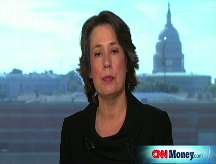Bank bailout: Everything you need to know
Why the Treasury's emergency infusion of dollars into banks just might work, and how you'll know if it does.
(Money Magazine) -- On Oct. 14, the U.S. Treasury announced it would spend $250 billion of taxpayer money to buy shares in U.S. banks. The feds hope that the infusion will resolve the financial crisis paralyzing the economy. Here, in 300 words or less, is everything you need to know about it.
Why not the original $700 billion bailout plan? Because Treasury Secretary Hank Paulson's first idea - buying $700 billion of suspect loans that banks couldn't unload - didn't ease fears. The week after that plan became law, the S&P 500 dropped 18%. Investors were concerned that unless the Treasury wildly overpaid for the loans, it wouldn't save the banks, says University of Chicago economist Douglas Diamond.
Why do the feds think the cash infusion will work? Simple math. Because banks can make more than $10 worth of loans for every dollar of equity, a cash infusion makes a bigger splash than using that same money to lop off bad debt. Plus, the tactic has succeeded elsewhere: When banks tanked in Sweden in the early 1990s, the government bought up stock as part of an ultimately successful bailout.
What will be the final price for taxpayers? Unclear. "Before we can figure out what it's going to cost to do the surgery, we've got to stabilize the patient," says Frank W. Anderson, a longtime banking analyst who now teaches at the University of Texas at Dallas. The government hopes that the banks will repurchase the shares within five years, but since it will need to borrow to get the money for the investment, the national debt will rise. Still, letting lending freeze and bank failures run amok would likely be much costlier in the long run.
How will I know if the cash infusion is working? Look for a loosening of credit as seen in a decrease in the TED spread, a measure of the banks' trust in one another. A week after this plan was announced, the spread had fallen. ![]()



